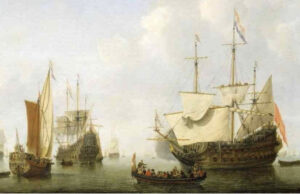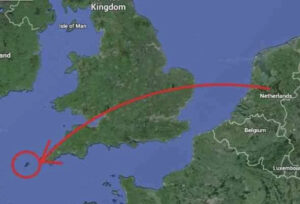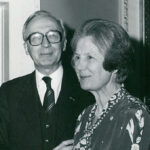Oliver Cromwell
 As Christmas approaches, with all of its feasts, we start thinking of all the goodies we will make and eat. For many people, pie is a big part of holiday meals, not to mention other meals year-round. People just simply love pie. They would bake them to share or give as gifts, and especially to have with tea when guests came by, but the one thing I can’t imagine is any kind of worship involving pie. Nevertheless…
As Christmas approaches, with all of its feasts, we start thinking of all the goodies we will make and eat. For many people, pie is a big part of holiday meals, not to mention other meals year-round. People just simply love pie. They would bake them to share or give as gifts, and especially to have with tea when guests came by, but the one thing I can’t imagine is any kind of worship involving pie. Nevertheless…
In 1644, an English statesman named Oliver Cromwell, came up with the totally irrational idea that pie was a pagan form of pleasure, so he banned pie. The eating of pie, baking pies, even thinking about pie. Well, maybe not exactly, but for the next sixteen years, no one could eat pie. So, like the prohibition years that would come about in the future, the eating of pie went…underground.
I can’t imagine having to bake and eat a pie in secret. For one thing, you can smell a pie baking. The aroma fills the house, and in the 1600s, they didn’t have a conventional oven like we have today. Dutch ovens were the first ovens used for baking. The pot would be embedded in the hot coals and ashes, and then more coals would be placed on its flat lid. Really, any large iron pot could be used as a Dutch oven. Double boilers were also used at this time. This meant that the aroma of the pie filled the area even more, because of the open chimney or the open pit in the outdoors where the pie was baked. I’m not sure if a violation of this new prohibitive law was a fine, jail, or death, but it was certainly something that made people realize that they must really want to bake that pie, if they would take such a risk for the chance to bake one.
Finally, in 1660, the Restoration leaders lifted the ban on pie baking, and the people rejoiced. I don’t know if  they went as crazy about getting back to eating pie as they did the end of the Prohibition years, but I would imagine that there were a few gatherings to celebrate the new-found freedom. These days we can’t imagine such a silly idea concerning pie, but with every revelation, there must first have been a misconception. Oliver Cromwell somehow saw something in pie that made him believe the way he did, so seriously that he would make a law. Perhaps, it was his own addiction to pie that made him think it must be bad…not that I know that he was addicted to pie, but people have given up food and drink items for that reason for centuries. In fact, people have had confused ideas when it comes to religion for centuries.
they went as crazy about getting back to eating pie as they did the end of the Prohibition years, but I would imagine that there were a few gatherings to celebrate the new-found freedom. These days we can’t imagine such a silly idea concerning pie, but with every revelation, there must first have been a misconception. Oliver Cromwell somehow saw something in pie that made him believe the way he did, so seriously that he would make a law. Perhaps, it was his own addiction to pie that made him think it must be bad…not that I know that he was addicted to pie, but people have given up food and drink items for that reason for centuries. In fact, people have had confused ideas when it comes to religion for centuries.

 Not many wars can be called…peaceful, but the Dutch-Scilly War is one that definitely can. Some wars start over borders, some over principles, and some over…well, who remembers. The Dutch-Scilly War lasted 335 years. That’s an amazingly long time in any war, and even more so when you consider that it had no battles or deaths. Oliver Cromwell had fought the Royalists to the edges of the Kingdom of England. Cromwell was an English general and statesman who, first as a subordinate and later as Commander-in-Chief, led armies of the Parliament of England against King Charles I during the English Civil War, subsequently ruling the British Isles as Lord Protector from 1653 until his death in 1658.
Not many wars can be called…peaceful, but the Dutch-Scilly War is one that definitely can. Some wars start over borders, some over principles, and some over…well, who remembers. The Dutch-Scilly War lasted 335 years. That’s an amazingly long time in any war, and even more so when you consider that it had no battles or deaths. Oliver Cromwell had fought the Royalists to the edges of the Kingdom of England. Cromwell was an English general and statesman who, first as a subordinate and later as Commander-in-Chief, led armies of the Parliament of England against King Charles I during the English Civil War, subsequently ruling the British Isles as Lord Protector from 1653 until his death in 1658.

In the West of Britain, Cornwall was the last Royalist stronghold. In 1648, Cromwell pushed on until mainland Cornwall was in the hands of the Parliamentarians. The Royalist Navy was forced to retreat to the Isles of Scilly, which lay off the Cornish coast and were under the ownership of Royalist John Granville. Before fleeing Cornwall, the Royalists raided a few Dutch shipping vessels as an act of revenge, then escaped to the Isles of Scilly. With that, the war was on. The Dutch turned up in Scilly demanding reparations from the Royalists. The Royalists refused and the Dutch declared war. The whole point of the war was to get restitution for the damage done by the Royalists, but the Dutch quickly realized that the Royalists were “dead broke!!” They didn’t have a penny to their name. Well, as we all know, you can’t get blood from a turnip, so going to war to receive money that could never be paid would do no good. In the end, they decided to call it a day and go home. A smart move if you ask me. The problem with the whole 
 thing is that they never declared peace with the Isles. They just completely forgot they were at war.
thing is that they never declared peace with the Isles. They just completely forgot they were at war.
In 1986, Roy Duncan, historian and Chairman of the Isles of Scilly Council, decided to investigate. He wrote to the Dutch Embassy in London. Research proved that that no peace treaty had ever been signed, so Duncan invited the Dutch ambassador Jonkheer Rein Huydecoper to visit the islands and officially end the “conflict” at last. Peace was declared on April 17, 1986, exactly 335 years after the supposed declaration of war. The Dutch ambassador joked that it must have been horrifying to the Scillonians “to know we could have attacked at any moment.”

